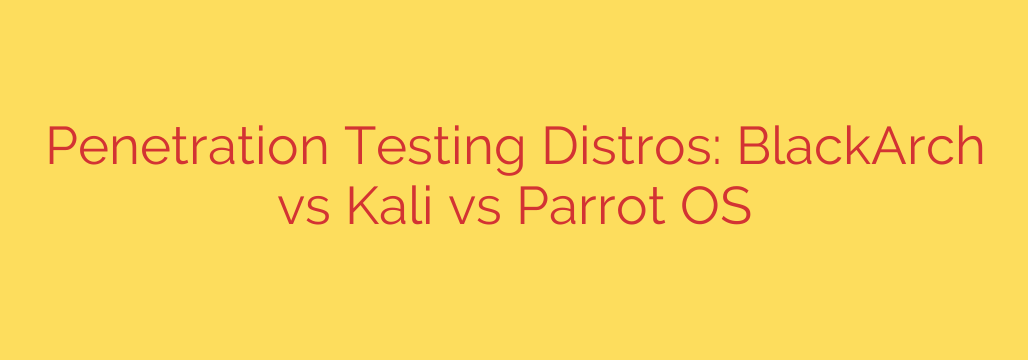
When delving into the world of cyber security and ethical hacking, choosing the right tools is paramount. For security professionals and enthusiasts, specialized operating systems known as penetration testing distros are essential. These distributions come pre-loaded with a vast array of security tools designed for tasks like vulnerability analysis, network scanning, web application testing, and reverse engineering. Among the most popular options are Kali Linux, Parrot OS, and BlackArch Linux. While they share the common goal of providing a robust platform for security work, each has distinct characteristics that cater to different needs and preferences. Understanding these differences is key to selecting the best distro for your specific activities.
Let’s explore these distributions in more detail.
Kali Linux
Perhaps the most well-known penetration testing distribution, Kali Linux is developed and maintained by Offensive Security. It is built on Debian and is specifically designed for digital forensics and penetration testing. Kali boasts a massive repository of hundreds of tools, covering virtually every aspect of security testing.
Key Features of Kali Linux:
- Extensive Toolset: Kali includes a vast collection of tools categorized for easy access, from information gathering and vulnerability analysis to exploitation and reporting.
- Strong Community Support: Due to its popularity, Kali has a large and active community, making it easy to find documentation, tutorials, and assistance.
- Regular Updates: Kali is frequently updated to ensure tools are current and the underlying system is stable.
- Customization: While primarily focused on its core purpose, Kali offers various desktop environments and is highly configurable.
- Hardware Support: Generally good support for a wide range of hardware, including wireless adapters essential for network testing.
Kali is often considered the industry standard for penetration testing due to its comprehensive nature and widespread adoption. It’s a solid choice for beginners and experienced professionals alike, provided they are comfortable with a Debian-based environment.
Parrot Security OS
Parrot OS, often referred to as Parrot Security OS, is another popular choice built on Debian. It is developed by the Frozenbox team and is designed for security professionals, ethical hackers, and privacy-aware individuals. Parrot OS aims to provide a lightweight and efficient environment for security work.
Key Features of Parrot OS:
- Balanced Toolset: While also featuring a large number of security tools, Parrot OS includes additional utilities focused on privacy and development.
- Lightweight Design: Parrot is known for being less resource-intensive than Kali, making it a good option for older hardware or virtual machines with limited resources.
- Focus on Privacy and Anonymity: Includes pre-configured tools for anonymity and cryptography, such as Tor, AnonSurf, and I2P.
- Multiple Editions: Offers different versions, including Security, Home/Workstation, and specialized editions.
- Modern Look and Feel: Features a more modern and visually appealing default desktop environment compared to Kali’s default.
Parrot OS presents a compelling alternative to Kali, particularly for those who value a lightweight system and integrated privacy features alongside their security tools. It strikes a balance between hacking tools and everyday usability.
BlackArch Linux
BlackArch Linux is an Arch Linux-based distribution specifically designed for penetration testers and security researchers. What sets BlackArch apart is its sheer volume of tools. It boasts the largest repository of security tools among the three, containing thousands of specialized utilities.
Key Features of BlackArch Linux:
- Massive Tool Repository: This is BlackArch’s defining feature, offering significantly more tools than Kali or Parrot. Tools are added frequently.
- Arch Linux Base: Inherits the Arch philosophy of simplicity and control. This also means it uses a rolling release model, providing the latest software versions constantly.
- Flexibility and Control: Arch-based systems offer high customization, appealing to users who prefer building and configuring their system precisely.
- Resource Intensive (Potentially): While the base Arch is lightweight, installing many tools can increase resource usage. Installation and management can also be more complex than Debian-based distros.
BlackArch is best suited for experienced users who are comfortable with Arch Linux and require access to the absolute largest collection of security tools available out-of-the-box. It’s not typically recommended for beginners due to the steeper learning curve associated with Arch.
Choosing the Right Distribution
The choice between Kali, Parrot, and BlackArch ultimately depends on your specific needs, experience level, and hardware.
- Choose Kali Linux if you want the most widely recognized and supported penetration testing platform with a vast, industry-standard toolset and robust community support. It’s an excellent starting point for most users.
- Choose Parrot OS if you are looking for a lightweight distribution that offers a solid collection of security tools alongside integrated privacy features, suitable for both security work and general computing on less powerful machines.
- Choose BlackArch Linux if you are an experienced Linux user, specifically comfortable with Arch, and require access to the absolute largest number of security tools available, valuing flexibility and a rolling release model.
All three distributions are powerful assets for anyone involved in cyber security. By evaluating their strengths and weaknesses against your requirements, you can select the platform that will best empower your ethical hacking and security testing endeavors.
Source: https://centlinux.com/blackarch-linux-vs-kali-linux-vs-parrot-os/








